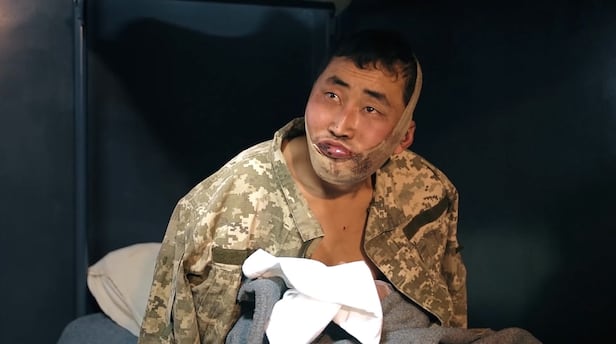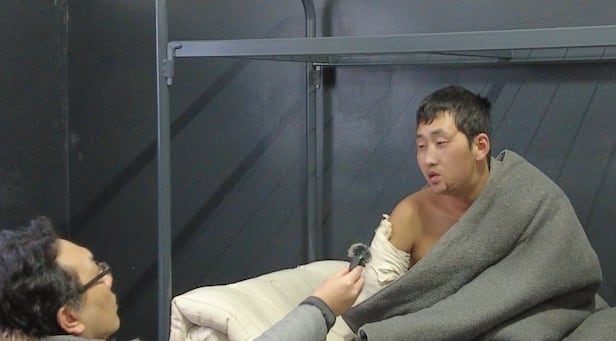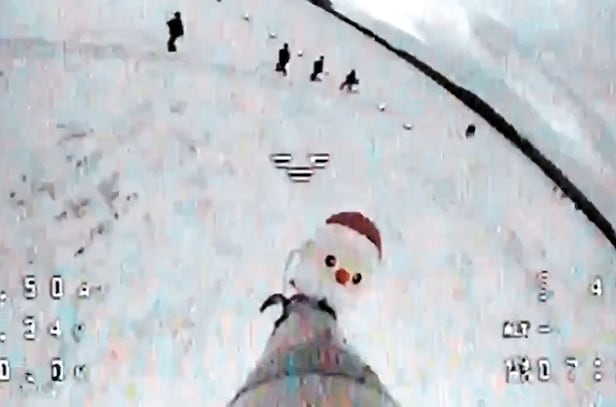
Two North Korean soldiers captured in Jan. 2025, after being deployed to the Russian frontlines in Kursk to assist Russia’s full-scale invasion of Ukraine. Ri (26, left), who served for 10 years, and Baek (21), who served for 5 years, revealed that they were part of the Reconnaissance General Bureau and under the surveillance of North Korean Ministry of State Security agents. / Jung Chul-hwan (Kyiv, Ukraine)
CHOSUN | Published February 19, 2025
Two North Korean prisoners of war, captured by Ukrainian forces last month, have spoken exclusively to the Chosunilbo at a prisoner-of-war (POW) camp in Ukraine. This marks the first time North Korean soldiers deployed to fight in Russia have been interviewed by the media. Mr. Ri (26), a reconnaissance sniper, and Mr. Baek (21), a rifleman, each served in the North Korean military for 10 and 4 years before they were deployed to Kursk, Russia, in October and November last year.
Both men had been held in solitary confinement after they were captured on Jan 9. While all North Korean troops sent to Russia were initially thought to have been part of the elite Storm Corps, the two soldiers insisted that they were actually affiliated with the Reconnaissance General Bureau, the intelligence agency that manages North Korea’s clandestine operations.
Ri and Baek disclosed that North Korean security agents were closely monitoring the troops in Kursk, spreading false rumors that South Korean forces in Ukraine were attacking North Korean soldiers with drones. (South Korea has not deployed soldiers to Ukraine.) “They [the security agents] told us that all Ukrainian military drone operators were actually South Korean soldiers,” Ri said.
Both men are only sons. Ri, who is from Pyongyang, said he had been told he was being sent “abroad for training” when he left the city on Oct. 10 last year. Baek said father passed away the year he enlisted, leaving his 50-year-old widowed mother behind before he left for Kursk. They shared that they dreamed of attending university after completing their military service. “I want to go to South Korea,” Ri said.
Arranging the interview with the North Korean POWs required extensive negotiations. When I finally met the two young men and shook hands with them, their palms felt rough and calloused from years of labor and intense military training. As I bid them farewell after the interview, they responded with a firm embrace. Their interviews will be published in two parts. The first installment focuses on Ri, the sniper.
“I haven’t seen my parents once in 10 years of military service. Most soldiers are only sons.”

Ri, a 26-year-old North Korean soldier who was interviewed by The Chosunilbo, shortly after being captured by Ukrainian authorities last month. His jaw was injured, and his face was wrapped in bandages. Regarding his injuries at the time, Ri stated, “The bullet passed through my arm, shattered the bone, and then hit my jaw, completely shattering it completely.” /Screenshot from Telegram

Ri, a North Korean soldier captured last month after being deployed to Kursk, Russia, and engaging in combat with Ukrainian forces, is interviewed by The Chosunilbo. Compared to his appearance immediately after his capture, the injuries on his face have healed significantly. Ri revealed that all his comrades who were deployed with him have died, and sighed, saying, ‘Most of us are only children. How must their parents feel?’ /Jung Chul-hwan (Kyiv, Ukraine)
Captured in late 2024 after being wounded in battle in Kursk, Ri was severely injured in his right arm and jaw. In the initial video released by Ukrainian authorities, he appeared with his jaw tightly wrapped, unable to speak, and looked visibly distressed. By the time I met him a month later in a solitary cell at a Ukrainian POW camp, he had recovered significantly. The compression bandage on his jaw had been removed, and though his speech was still slow and somewhat slurred, he could now speak. A large scar from a gunshot wound was visible on his chin.
His small cell contained a Chinese-made television, playing music in the background. As we began the interview, he picked up the remote control and lowered the volume. “You’re a journalist, right?” he asked, occasionally interrupting the interview with questions. Despite being from Pyongyang, a relatively privileged area in North Korea, he described growing up in difficult circumstances. Fighting back tears, he said, “Now I’ve been sent to war, and I’ve faced death countless times.”
Are both your parents still in Pyongyang?
“(Nods silently.)”
Do you have any siblings?
“I’m an only child.”
Do your parents know where you are?
“No, they don’t. I haven’t had any contact with home since three months before I left.”
When did you leave for Russia?
“We left on October 10. Before that, we were at Jagang Province to help with flood recovery efforts for about a month. Then we were sent to a training ground for training before departing for Russia in early October.”
When did you arrive in Kursk?
“Around mid-December. We trained in Vladivostok first before being transferred here.”
Do you have anything you’d like to say to your parents?
“My parents are very sick. My father has difficulty moving, and my mother struggles with indigestion. If the North Korean government learns of my capture, I fear my parents will be forced to leave Pyongyang.”
(Ukrainian authorities had already released a video of him last month, likely confirming his identity, making his fears all the more real.)
What unit were you assigned to?
“The Reconnaissance General Bureau.”
What was your rank?
“Private. I enlisted in 2015 and was due for discharge soon.”
You served as a reconnaissance sniper. Is that correct?
“Yes.”
What were you told before being sent to Russia?
“I was told I was going there as a student for training. I had no idea I would be participating in combat.”
When did you first learn you would be fighting?
“After arriving in the Kursk region, we were placed in a staging area. That’s when we were informed.”
How did you travel to Kursk?
“We took a train, then a plane, and finally a bus.”
How many soldiers were deployed with you?
“Around 2,500.”
North Korea has not acknowledged that its troops are fighting in Ukraine.
“It’s a secret.”
Why do you think that is?
“It could damage North Korea’s foreign relations.”
Did you face any difficulties working with Russian troops?
“As lower-ranking soldiers, we had little interaction. Everything was handled by higher-ups—ammunition, supplies, clothing. There wasn’t much direct communication between North Korean and Russian soldiers.”
How did you communicate with them?
“We used smartphone translation apps.”
Had you used a smartphone before?
“This was my first time using a translation app. I had never interacted with foreigners before.”
Your unit, the Korean People’s Army Special Operations Force (KPASOF), is known for its loyalty.
“It’s highly trained in combat, construction, and other missions. Have you heard of Samjiyon?”
What about it? (Samjiyon is a city that Kim Jong-un redeveloped as a tourist destination.)
“In December 2019, our unit was sent there for construction. The conditions were brutal—freezing cold, waist-deep snow, and no shelters. We had to build barracks while chipping away at frozen ground with pickaxes. It was so cold that urine would freeze the moment it hit the ground.”
How does the cold in Kursk compare?
“Samjiyon was much worse. This is nothing.”
How have you been treated since capture? Are you getting enough food?
“My jaw injury hasn’t healed, so I can’t eat hard food. I mostly eat porridge. I’d like to have ramen, but I can’t.”
How did you get injured?
“I joined combat on Jan. 5. The first wave of troops suffered heavy losses due to drone strikes and artillery fire. We relied on Russian artillery support, but they fired behind enemy lines instead of covering us properly. That led to unnecessary casualties.”

A Ukrainian drone camera captures an attack on a suspected North Korean soldier in December 2024. A Santa Claus figurine is attached to the front of the drone./Special Operations Forces of Ukraine
How many soldiers were in your unit during the battle?
“Three of us were in a rear attack team. Our company launched a frontal assault while we moved in to disrupt enemy lines. But we walked into an ambush—drones spotted us.”
Weren’t you trained to deal with drones?
“We received basic training, but there was no specific strategy for drone warfare. Our training emphasized speed—running, hiding, or shooting drones from the ground. We never learned how to take them down effectively.”
Did you start to understand drones better after facing them in combat?
“Yes.”
What happened after the drones spotted you?
“There were three of us. My team leader and another soldier had already been shot. I was the only one left. I fired back while trying to reach cover, but I got hit.”
Where were you wounded?
“A bullet went through my arm, breaking the bone, and then hit my jaw, shattering it. I lost consciousness from blood loss.”
When did you wake up?
“It was night. I had been shot in the early morning. When I tried to move, I felt dizzy and weak. I sat there for a long time before deciding to retrace my steps. Eventually, I ran into fellow North Korean soldiers, though they weren’t from my company. They bandaged my wounds.”
You received emergency treatment, so why didn’t you return with the other North Korean soldiers?
“Well, I tried, but do you know what a ‘devil drone’ is?”
“All my comrades died, I was the only survivor… I might have committed suicide if I had a grenade”
“What’s that?”
“It’s a very large drone that carries bombs. It has an infrared sensor, which allows it to fly around at night, searching for targets and dropping bombs. Because of the sensor, it can detect us and drop grenades, so we couldn’t move. We had to hide in a secure area we had already taken over. But around 3 AM, the Ukrainian forces showed up in armored vehicles, firing machine guns and sending soldiers into our position. We had no choice but to retreat, and as we did, another drone attacked, killing one or two of the men who were helping me. I was the only one who survived.”
How many were there, and how did you end up being the only survivor?
“There were six of us, and all five of them died.”
What happened next?
“It was pitch dark, and I didn’t know the area. I thought if I just crossed the next ridge, I’d be in our area, but it turned out I was wrong.”
So, you went the wrong way?
“Yes. After that, I tried to find my way back, but while I was climbing, I was captured. At that time, I couldn’t even use my arms, and I had no weapons — no grenades, no knife. I couldn’t carry anything heavy because of my injuries… So, even if I had tried to resist, it was obvious I would have been captured. If I had a grenade, maybe I would have tried to take my own life.”
Were you ordered to commit suicide?
“In our army, being captured is seen as betrayal. (Which implies that North Korean soldiers are instructed to commit suicide if captured.)”
READ FULL ARTICLE
SOURCE: www.chosun.com
RELATED: N. Korea threatens treason charges to silence rumors of captured soldiers
The Rodong Sinmun newspaper reported March 7, 2024, that North Korean leader Kim Jong Un had paid a visit the previous day to critical operational and training bases of the Korean People’s Army on the western front and toured training facilities there. The photograph depicts North Korean soldiers doing exercises. (Rodong Sinmun, News 1)
DAILY NK | Published February 18, 2025
The military’s response makes it clear that they refuse to officially acknowledge either the Russian deployment or the capture of North Korean personnel
North Korean authorities have launched a harsh crackdown to suppress rumors about their troops being captured in Ukraine, Daily NK has learned.
A military source told Daily NK recently that the General Political Bureau (GPB) and Military Security Command of the Korean People’s Army (KPA) issued an emergency joint order on Feb. 1. The directive, sent to political and security departments across military commands, headquarters, and training centers, called for “maximum inspections of mail between military bases and the public, and stern punishments for spreading rumors within KPA units.”
The emergency order came in response to a Jan. 23 report from counterintelligence departments in border provinces, including Ryanggang and North Hamgyong. Their written opinion to the Ministry of State Security warned that rumors about North Korean troop deployments to Russia were spreading rapidly among border residents, threatening social order.
After the Ministry reported these concerns to the ruling party, the Central Military Commission ordered the GPB and Military Security Command to take strong measures against the spread of information about both the troop deployment and captured soldiers.
The new directive labels such rumors as “fabrications resulting from enemy schemes to suffocate the Democratic People’s Republic of Korea” and warns that “even the slightest spread or mention of such falsehoods” will be treated as treason.
“Political and security departments across the military are conducting intensive indoctrination, declaring these rumors as enemy scaremongering and instructing soldiers never to discuss them,” the source said. The order specifically targets liaison personnel who contact the public, promising severe punishment for spreading information about troop deployments or captured soldiers.
The military’s response makes it clear that they refuse to officially acknowledge either the Russian deployment or the capture of North Korean personnel.
The crackdown extends beyond military personnel to civilians. “The Ministry of State Security has designated soldiers’ families for special ideological inspection,” the source revealed. “Provincial branches must now monitor these families’ monthly movements and conduct ideological indoctrination when deemed necessary.” The order specifies that individuals may face punishment if authorities discover “ideological flaws.”
READ FULL ARTICLE
SOURCE: www.dailynk.com



Be the first to comment